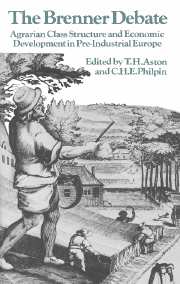Book contents
- Frontmatter
- Contents
- Preface
- Introduction
- 1 Agrarian Class Structure and Economic Development in Pre-Industrial Europe
- 2 Population and Class Relations in Feudal Society
- 3 Agrarian Class Structure and the Development of Capitalism: France and England Compared
- 4 Peasant Organization and Class Conflict in Eastern and Western Germany
- 5 A Reply to Robert Brenner
- 6 Against the Neo-Malthusian Orthodoxy
- 7 A Crisis of Feudalism
- 8 In Search of Agrarian Capitalism
- 9 Agrarian Class Structure and Economic Development in Pre-Industrial Bohemia
- 10 The Agrarian Roots of European Capitalism
- Index
- Past and Present Publications
5 - A Reply to Robert Brenner
Published online by Cambridge University Press: 27 October 2009
- Frontmatter
- Contents
- Preface
- Introduction
- 1 Agrarian Class Structure and Economic Development in Pre-Industrial Europe
- 2 Population and Class Relations in Feudal Society
- 3 Agrarian Class Structure and the Development of Capitalism: France and England Compared
- 4 Peasant Organization and Class Conflict in Eastern and Western Germany
- 5 A Reply to Robert Brenner
- 6 Against the Neo-Malthusian Orthodoxy
- 7 A Crisis of Feudalism
- 8 In Search of Agrarian Capitalism
- 9 Agrarian Class Structure and Economic Development in Pre-Industrial Bohemia
- 10 The Agrarian Roots of European Capitalism
- Index
- Past and Present Publications
Summary
I wish to comment briefly on Robert Brenner's article, carefully following the thread of his argument, which is certainly very skilful and well informed but at times not only somewhat superficial but also extremely insular. For my part, I will speak of a “neo-Malthusian” and not a “Malthusian” model. This takes into account the fact that many new factors have appeared since the time of Malthus to make both the factual and the theoretical position more complicated. Here then are my reactions, numbered from one to thirteen.
1. Despite what Brenner suggests at the outset of his article, the neo-Malthusian model in no way turns the class structure into an abstraction. On the contrary, it incorporates it, quite simply, by taking care to stress the role of concrete social groups (landowners, farmers, agricultural workers and the like) over and above abstract economic categories (ground rent, business profits, wages). In this connection – and I apologize for citing my own work but Brenner himself has put me in this position – see my Paysans de Languedoc.
2. Brenner criticizes both Postan's work as well as my own, but he neglects to mention (and this is curious on the part of a scholar with such an impressive command of the sources) the extensive research into European, and particularly German, rural history undertaken many years ago by Wilhelm Abel. Abel's conclusions fully support the neo-Malthusian thrust of the work of Postan and myself.
3. Brenner talks about the “surplus-extracting, or ruling, class(es)”. It is perhaps surprising to find a talented historian making such a simplistic assimilation between power (political) and surplus value (economic). Would Engels himself, despite his lack of nuance, have risked so summary an equation? I hardly venture to think so.
- Type
- Chapter
- Information
- The Brenner DebateAgrarian Class Structure and Economic Development in Pre-industrial Europe, pp. 101 - 106Publisher: Cambridge University PressPrint publication year: 1985
- 4
- Cited by

